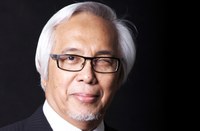 Malaysian biologist and policymaker Zakri Abdul Hamid, a 1996 TWAS fellow, has been named the first chairman of the Intergovernmental Platform on Biodiversity and Ecosystem Services (IPBES), an independent international body inaugurated last month in Bonn, Germany.
Malaysian biologist and policymaker Zakri Abdul Hamid, a 1996 TWAS fellow, has been named the first chairman of the Intergovernmental Platform on Biodiversity and Ecosystem Services (IPBES), an independent international body inaugurated last month in Bonn, Germany.
Biodiversity and ecosystem health in oceans and fresh waters, on the land, and in the air have been declining rapidly in recent decades, and that can have a direct impact on human well-being. IPBES (http://www.ipbes.net/) will provide science and related information – on the cross-border trade of flora and fauna, for example – to support effective policy worldwide.
IPBES will seek to have the same global impact as the Intergovernmental Panel on Climate Change (http://www.ipcc.ch/), providing policy-relevant advice to world governments, in this case in biodiversity and ecosystem services, Zakri said in an interview. “Biodiversity is the sovereign right of each country, and it is also the common concern of everyone,” he said. “Therefore, it’s in everyone’s interest to preserve it and ensure that it is used in a sustainable manner”.
IPBES, which is open to all member countries of the United Nations, will be an interface between the scientific community and policymakers.
Zakri has extensive experience in biodiversity issues. He is the science advisodr to the prime minister of Malaysia, and chairman of the Malaysian National Professors Council. From 1997 to 1999, he was the chairman of the Subsidiary Body on Scientific, Technical and Technological Advice of the Convention on Biological Diversity (http://www.cbd.int). From 2001 to 2005, he was co-chair of the Millennium Ecosystem Assessment Board, and in 1998 he received Malaysia's Langkawi Award for exemplary contribution in the environmental field.
Educated in Malaysia and the United States, Zakri specialized in plant genetics and was a former Fulbright scholar. He was one of the original negotiators of the Convention on Biological Diversity, representing the Malaysian government. From 2001 to 2008, he was the director of the Institute of Advanced Studies at the United Nations University in Japan.
When it comes to biodiversity, Zakri has a clear vision of the road that lies ahead, and this awareness is informing his agenda during the early days of his three-year term.
“IPBES has been conceived as a factual platform, to help build a straightforward link between scientists and policymakers, to provide scientific information on biodiversity and ecosystem services to governments and other relevant stakeholders, and to support policy formulation and implementation by identifying policy-relevant tools and methodologies,” he explained.
“This will prompt us to collect and supply scientifically credible and independent information, providing each party – governments and academia, scientific organizations and NGOs, but also the indigenous communities – with tools and methods to understand the problems and make informed decisions.”
IPBES was formed in April 2012 at a meeting in Panama. More than 500 delegates from most of IPBES's 105 member states attended the plenary meeting last month in Bonn to formally launch the organization. The event was instrumental to the establishment of a Bureau and Multidisciplinary Expert Panel (MEP), the adoption of the initial budget and the development of the initial IPBES work programme.
Zakri and fellow organizers acknowledge that other successful international panels will have a strong influence on IPBES. The organization “has much to learn from the Nobel Prize-winning IPCC," Zakri said. "Definitely, our stakeholders will include all the biodiversity-related conventions”.
The United Nations Environment Programme (http://www.unep.org/) will provide the secretariat for the IPBES, which will be based in Bonn.
IPBES was conceived during the 2003 G8 summit in Évian-les-Bains, France, when French President Jacques Chirac proposed an independent scientific panel on biodiversity.
“It took us almost a decade to achieve this goal," Zakri said. "Now, my wish for the future is to succeed in having a universal membership, reflecting the composition of the United Nations and, ultimately, the importance that biodiversity must have for mankind”.
Cristina Serra

